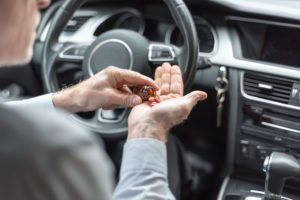
Portable breath tests help to confirm a police officer’s suspicions that a driver is under the influence of alcohol, and soon a similar portable testing device may be in use for suspected drugged drivers.
Drugged Driving Tests
As we mentioned on the blog a while ago, Minnesota police recently began a pilot program that allowed them to collect preliminary data on drivers that they suspected were under the influence of marijuana or other drugs. You can learn more about the pilot program by reading the original blog, but we’ll quickly summarize it for reference:
- 57 officers who were certified as drug recognition evaluators had access to two different testing instruments.
- The pilot program was completely voluntary, meaning drivers were asked if they would like to submit to testing after they had already been placed under arrest for suspicion of drugged driving.
- The results were not used as probable cause for arrest, as part of prosecution or as evidence to place sanctions on driver’s licenses.
- Some drivers agreed to be tested on both devices, as there were 329 tests conducted on a total of 268 drivers.
- The screening test produced preliminary roadside results for the presence of six categories of drugs.
- The test did not predict current impairment, but rather suggested recent use.
After looking at the results from the pilot program, police found that drugs were detected in 87 percent of tests. The most common substances found during testing were cannabinoids (THC or marijuana), methamphetamines or amphetamines. More than one drug was found in 62 percent of tests. 90 percent of drivers who had found to have been drinking also tested positive for one or more drugs.
While the results are interesting, it important to note that much like portable breath tests, the portable drug tests would not be admissible in court. So what’s the point of using them? According to the Office of Traffic Safety, the results of the test could be used as evidence when applying for a warrant for a more reliable test, like a blood or urine sample. Blood and urine samples are admissible in drunk and drugged driving cases.
We will likely see some form of the portable drugged driving test be adopted statewide in the coming years, but it will be interesting to see if it really turns out to be an effective tool. Unlike a drunk driving case, refusal to submit to a portable drugged driving test is not a crime in and of itself, so there are no repercussions for wisely opting not to potentially hand the officer evidence to be used against you. It should remain this way, especially if the device only detects for recent use and not current impairment. So if people can freely opt not to submit to the test, and any results are only used to apply for a warrant for more accurate testing, it seems unlikely that they will really be used much in the current format. Surely if a certified drug recognition specialist sees enough evidence to suggest the driver is under the influence, they can make a compelling enough case for a blood or urine draw without needing the driver to essentially self-incriminate.
We’re leery that the device will bear much fruit in its current format, but if the possibility of roadside drug testing helps drivers to make better decisions behind the wheel, there’s a chance the portable testing devices can keep our roads just a bit safer. We’ll keep our eyes on the program and its intended uses going forward.
For now, if you need help contesting a DWI or drugged driving case, reach out to Avery and the team at Appelman Law Firm today at (952) 224-2277.





